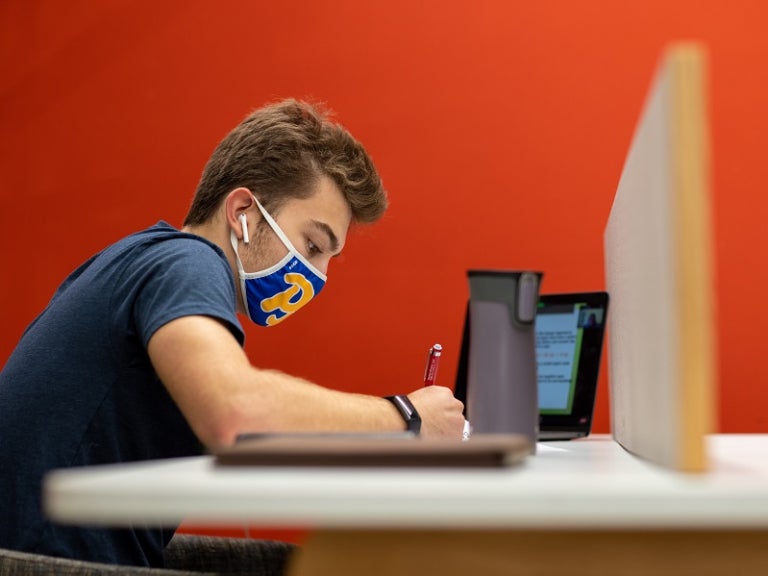
No matter how hard we try, motivation is not there 100% of the time. Even if the career you’re chasing is your dream career, it’s not always easy to stay productive. However, as we all know, it’s necessary that we continue learning and growing even when we aren’t feeling motivated at the moment. Over the past three years, I’ve learned some ways to both increase motivation and work through the rough patches.
- Look to your future aspirations and past achievements to find motivation.
- Break your studying into bite-size sessions to stay focused.
- Seek inspiration from others who are in the same course of study.
- Make small and healthy changes that suit your daily routine, like adding in reading!
- Set realistic goals for how you use your time rather than pledging to wake up earlier or stay up later than you are comfortable to get that extra studying in.
Here’s a closer look at each of these strategies:
What I’ve found is that motivation comes from the past and future, but not the present. We’re motivated by what we’ve done or haven’t done in the past and even more motivated by what we want to accomplish in the future. Often, this motivation seeps into the present, but when this isn’t the case, it can help to look back and forward to find it again. It helps me to look back and think about what I’ve already accomplished and things I’m proud I was able to do. These past achievements don’t have to be spectacular; they only have to be something meaningful to you. Even more motivational than the past, is the future. Meet with your advisor or reach out to someone in the field you aspire to go into. Talk to them about where you are, the challenges you still have to overcome and what advice they would give you going forward. This helps more than you might believe and can really give you that extra push forward.
The best way to study when you aren’t motivated is to break up active studying into smaller sessions. When you have smaller incremental goals, studying a large topic or for a big exam becomes much easier. A great way to separate study sessions productively is through the Pomodoro Method. This method means setting a timer for 25 minutes of focused studying. Once the time goes off, you get a five-minute break. Then onto the next 25 minutes of studying. Once you cycle through four study sessions, one Pomodoro is complete, and you can take a longer break. This seems much more bearable, and you actually end up studying more than you would have if you tried to study for hours at a time. It’s much more likely you’ll stay focused for 30 minutes than for two, three or four hours straight. It’s also a great way to keep track of what you’ve accomplished throughout the day - it’s satisfying to look back and see how many Pomodoro’s you’ve competed.
Look to others on the same path as you. This might be through a friend group in your major or people you met in a pre-health club. More than likely, these students are going through the same struggles of finding motivation. Also, YouTube is a great place to learn about the path you are pursuing and the other students on the same journey. There are hundreds of videos that other students have created about studying, daily life, application processes and expectations in each pre-health field. You can follow their path to PT, OT, medical school or any graduate school and see what made them successful or what prevented them from making it the first time around.
Small changes to your daily routine can help keep motivation and productivity up for the long run. One thing in particular that helped me stay productive each day was to read before going to sleep instead of watching TV or scrolling through social media. It might seem impossible to read after studying and working all day, but if you find a book you really enjoy, it becomes something you look forward to. Exercising every other day is also helpful in remaining productive. This doesn’t have to take long - 30 minutes is enough to give you the mental clarity and focus to make the most of the day.
Lastly, it’s most important to create a studying/working schedule that fits your preferences. We associate getting up extremely early with being productive, but this isn’t always the case. Waking up at a more normal hour can lead to just as much productivity, just with a later end time. Going to sleep early instead of studying because you’re going to wake up early to be productive is a trap we’ve all fallen into. It’s possible (and maybe probable) that this early morning productivity won’t actually end up happening, and your day will start when it usually does. So if the morning isn’t for you, which I feel is the case for a lot of people, it’s better to be realistic about when you will consistently start your day and create a schedule around that. It’s much more efficient to assess when you focus best and remain consistent in your working/studying hours. Productivity is productivity no matter what time of the day it occurs.
I hope you can take something away from this and find the motivation you’ve been seeking.
--

Written by: Mara Hartoyo, Pre-medical student
Current SHRS student, Class of 2023, Rehabilitation Sciences
